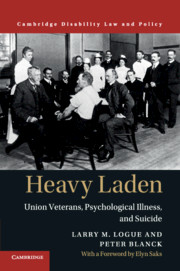'The hidden injuries of war are by no means an invention of the last hundred years. Veterans of the American Civil War carried the often silent and unacknowledged traces of combat with them, in body and soul, for the rest of their lives. Logue and Blanck merit our gratitude for having brought the American soldiers of 1861–65, Northerners and Southerners, black and white, into the growing body of literature on the war-related mortality and morbidity of soldiers who return from war.'
Jay Winter - author of War beyond Words: Languages of Remembrance from the Great War to the Present and editor of The Cambridge History of the First World War
'Suicide amongst veterans is an enigma. It is shocking, deeply disturbing, and tragic in nature, with the potential of damning the impact of war. But, it is subject to extremes: it can either defy analysis due to underreporting and the elusive nature of assigning causation, or it can slip into a melodramatic tirade against war. Logue and Blanck recognize the subtleties of the subject, and deliver a nuanced consideration of the plight of Civil War veterans, centering on the topic of suicide. A must-read for those concerned about the impact of this or any war.'
Eric T. Dean, Jr - author of Shook over Hell: Post-Traumatic Stress, Vietnam, and the Civil War
'Logue and Blanck offer groundbreaking analyses and insights of how veterans across the spectrum of humanity perceived and coped with warfare’s consequences. Logue and Blanck brilliantly open up new historical vistas, reminding me of the promise by which I closed The Center Cannot Hold: ‘the humanity we all share is more important than the mental illness we may not'.'
Elyn Saks - author of The Center Cannot Hold: My Journey through Madness, from the foreword
'An important read for students of veterans affairs.'
Source: The NYMAS Review
'… [the authors'] expansive source base, illuminating demographic comparisons, and nuanced portrait of the distinctive burden that Civil War soldiers had to bear are impressive.'
Kathryn Shively Meier
Source: The Journal of Interdisciplinary History
‘This genuinely interdisciplinary work offers the exciting potential opportunity for further research into veteran communities which integrates History, Law, Disability Studies, Medicine, and Policy.’
Michael Robinson
Source: War in History



